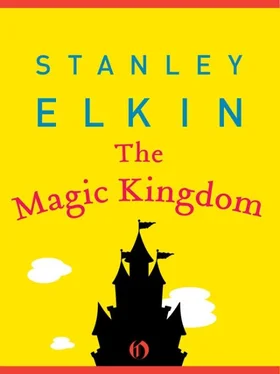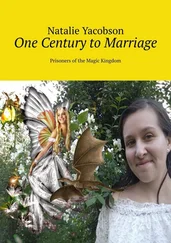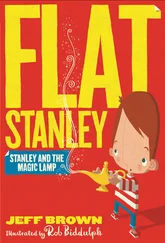“No, no,” she’d say, “don’t be afraid, touch it. Go ahead, touch my skin. Oh, I know it looks icy but it isn’t. It’s as warm as your own. Go on, touch it. I don’t mind.”
And sometimes, occasionally, once in a while, a brave soul would. He would touch it gingerly, laying the back of his hand against her blue cheek while Janet took his own pink hand in her two blue ones and guided it along the length of her blue arm, her blue neck and blue shoulders, soothing him, comforting. “There,” she’d say, “you see? It’s not cold. It’s blue like this because the lungs build up pressure and the patches burst where the surgeons keep sealing it and grafting blood vessels onto it like you’d patch an old tire. It could have been corrected, but they say I have this ventricular septal defect. You mustn’t be afraid.” But the child would think of Janet Order’s blue defect and shudder involuntarily in her temperate blue grasp.
She had only grown kind. When she was smaller, and had played the secret games of childhood, the other children had been terrified of the blue surgical scars crisscrossing her chest like surfaced veins, of her blue behind and little blue mons. Wickedly, she’d teased them, cruel and comfortable in her blue power over them.
On the day of the letter, tears were rolling down her cheeks when her parents returned. “This letter came. I didn’t open it but I think it’s about my dream holiday.” She handed the envelope to her father.
“It is,” he said. “Oh, it’s grand news, Janet. In two weeks you’ll be leaving for Florida. Can we get her ready in time?” he asked his wife. “She’ll need some summery dresses, I should think. And a new bathing suit. What do you think, Doris? Can we get her ready? Oh, ducks, don’t cry. Don’t cry, ducks.”
“Our Janet’s a big girl now,” her mother explained. “Sometimes when they’re extra especially happy the only way a big girl can show it is by crying.” Then she turned to her daughter. “But please, Janet,” her mother said, “you know it’s not good for you to become emotional. Your lovely brown eyes have gone all blue.”
“I’m not worthy, Mummy,” her daughter whispered.
“Don’t be silly, Janet. All those operations? You’ve been a dreadfully burdened little girl.”
And then Janet Order confessed that her blueness had never been a burden and told her parents what she’d said to those little boys, whispered to them in those dank basements and dim potting sheds and in the obscure corners of the deserted common, frightening them, boasting of her blue bowels and blue pee, commanding their loyalty by the blue power of her blue tears.
Noah Cloth, confined to hospitals at a time in his life when other boys his age were in school, could not read well or do his maths. His history was weak, his geography, most of his subjects. Only in art had he done well, and now he’d lost his ability to draw. Nine times he’d been operated on for bone tumors: in his right wrist, along his left and right femurs, on both elbows, once at the base of his skull, and once for little garnetlike tumors around a necklace of collarbone. Twice they had cut into his left hand by the bones beneath the skin of his ring finger. The first operation had been successful, yielding tiny growths of a benign jewelry, but when the surgeons went back in a second time, they discovered the boy had severe osteosarcoma and had to amputate the finger. They told Noah’s parents they must expect more malignancies, and a nice lady from a hospice came to explain what was what to the kid.
Noah argued with the woman, asserting that there were just hundreds of bones in the human body that were dispensable, the bone in his ring finger, for example. He told her he could live a normal life, not indefinitely, of course, no one lived forever, and probably not without some inconvenience, every once in a while sacrificing a really important poisoned bone or so, but what he really feared, he said, was that one of these days the poison would find its way into his leg and they’d have to amputate it and replace it with an artificial one — he saw what went on; he’d spent lots of time on the rehabilitation wards — and he’d have to walk with a cane. He laughed and said he guessed worse things had happened at sea, but what if it was the right leg they had to cut off?
“The right leg?” asked the lady from the hospice.
“Well, sure,” he said, “then I’d really be knackered, wouldn’t I? Well, I mean I spent all that time on the wards, didn’t I? So I know about these things.” She wasn’t following him. “It’s the opposite limb,” Noah explained. “The cane goes in the hand opposite the wounded limb.”
“I don’t…”
“Oh, lady,” Noah Cloth said, and held out the hand with the missing finger. “It’s all right once you get accustomed, but how’s a bloke supposed to rehabilitate himself into a wood leg if he can’t even hold his cane proper? I mean, it’s what happened with my drawing pens, isn’t it?”
And only a few weeks before, he’d begun to detect a sharp pain along the length of his right shin. Uh-oh, he thought, but said nothing to his parents or the doctors, and nothing either to the busybody from the hospice, because he didn’t want to give her the satisfaction and because, too, she only depressed him with her arguments.
“Don’t you see, Noah,” she told the eleven-year-old boy when she called round at his house to ask him to die, “you’re denying the facts. Don’t you see how typical your behavior is? Kübler- Ross tells us that denial, rage, bargaining, and acceptance is the classic pattern of people in your circumstance. You can’t get past even the first stage. How do you expect to come to terms with your situation?”
“Well, if I don’t,” Noah Cloth said, “I won’t die then, will I?”
“That’s bargaining,” the woman said, pouncing cheerfully.
“No,” Noah Cloth said evenly, “it’s rage.”
The hospice woman left him a pamphlet.
Which, since he couldn’t read, he threw to the corner of his bed, where his father found it when he came into Noah’s room later that evening. The father picked the pamphlet up to examine. “You know what this is about?” he asked.
“No,” Noah Cloth said.
“Do you want me to read it to you?”
“Is it a story?”
“No,” his father said.
“Because there’s better stories on the telly,” Noah said.
“This isn’t a story,” his father said and cleared his throat while Noah quietly began to grieve and his mother came into the bedroom to listen as the father read to the son about letting go of life, tough talk about the child’s fears, how it was important not to be ashamed to die. When his father finished he closed the book and looked at the boy.
“It was a story after all,” Noah Cloth said, and drew a deep breath and felt a stitch. No bones there, he thought absently, ignorant still of what his disease might yet do to him — all its oyster irritabilities and abrasions, the little shards of malignant pearl piercing his lungs like studs, glowing like nacre, shining his breath like dew.
“Some dream holiday,” Benny Maxine, the Gaucher’s disease, complained to Rena Morgan, the cystic fibrosis.
“What’s wrong with Disney World?”
“Well, nuffink if what you’re into is rides and a bunch of dwarfs and down-and-out actors what can’t get proper work all dressed up like animals wif their paws stuck out for a bit of graft every time you might want to take your picture wif dem. I’m at liberty to tell you dat’s not my idea. Benjamin Maxine, luv. Benny to me mates. I don’t fink I’ve ’ad the pleasure.”
“Rena Morgan, Benjamin.”
“Benny to me mates.”
Читать дальше












